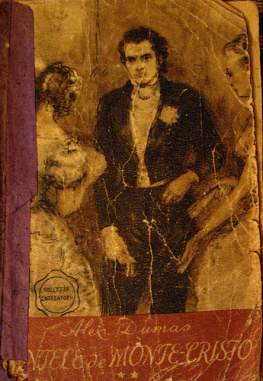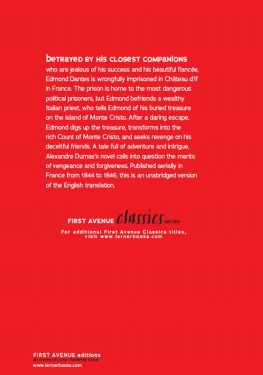T oward the close of the year 1657, a very plain carriage, with no arms painted on it, stopped, about eight oclock one evening, before the door of a house in the rue Hautefeuille, at which two other coaches were already standing. A lackey at once got down to open the carriage door; but a sweet, though rather tremulous voice stopped him, saying, Wait, while I see whether this is the place.
Then a head, muffled so closely in a black satin mantle that no feature could be distinguished, was thrust from one of the carriage windows, and looking around, seemed to seek for some decisive sign on the house front. The unknown lady appeared to be satisfied by her inspection, for she turned back to her companion.
It is here, said she. There is the sign.
As a result of this certainty, the carriage door was opened, the two women alighted, and after having once more raised their eyes to a strip of wood, some six or eight feet long by two broad, which was nailed above the windows of the second storey, and bore the inscription, Madame Voison, midwife, stole quickly into a passage, the door of which was unfastened, and in which there was just so much light as enabled persons passing in or out to find their way along the narrow winding stair that led from the ground floor to the fifth story.
The two strangers, one of whom appeared to be of far higher rank than the other, did not stop, as might have been expected, at the door corresponding with the inscription that had guided them, but, on the contrary, went on to the next floor.
Here, upon the landing, was a kind of dwarf, oddly dressed after the fashion of sixteenth-century Venetian buffoons, who, when he saw the two women coming, stretched out a wand, as though to prevent them from going farther, and asked what they wanted.
To consult the spirit, replied the woman of the sweet and tremulous voice.
Come in and wait, returned the dwarf, lifting a panel of tapestry and ushering the two women into a waiting-room.
The women obeyed, and remained for about half an hour, seeing and hearing nothing. At last a door, concealed by the tapestry, was suddenly opened; a voice uttered the word Enter, and the two women were introduced into a second room, hung with black, and lighted solely by a three-branched lamp that hung from the ceiling. The door closed behind them, and the clients found themselves face to face with the sibyl.
She was a woman of about twenty-five or twenty-six, who, unlike other women, evidently desired to appear older than she was. She was dressed in black; her hair hung in plaits; her neck, arms, and feet were bare; the belt at her waist was clasped by a large garnet which threw out sombre fires. In her hand she held a wand, and she was raised on a sort of platform which stood for the tripod of the ancients, and from which came acrid and penetrating fumes; she was, moreover, fairly handsome, although her features were common, the eyes only excepted, and these, by some trick of the toilet, no doubt, looked inordinately large, and, like the garnet in her belt, emitted strange lights.
When the two visitors came in, they found the soothsayer leaning her forehead on her hand, as though absorbed in thought. Fearing to rouse her from her ecstasy, they waited in silence until it should please her to change her position. At the end of ten minutes she raised her head, and seemed only now to become aware that two persons were standing before her.
What is wanted of me again? she asked, and shall I have rest only in the grave?
Forgive me, madame, said the sweet-voiced unknown, but I am wishing to know
Silence! said the sibyl, in a solemn voice. I will not know your affairs. It is to the spirit that you must address yourself; he is a jealous spirit, who forbids his secrets to be shared; I can but pray to him for you, and obey his will.
At these words, she left her tripod, passed into an adjoining room, and soon returned, looking even paler and more anxious than before, and carrying in one hand a burning chafing dish, in the other a red paper. The three flames of the lamp grew fainter at the same moment, and the room was left lighted up only by the chafing dish; every object now assumed a fantastic air that did not fail to disquiet the two visitors, but it was too late to draw back.
The soothsayer placed the chafing dish in the middle of the room, presented the paper to the young woman who had spoken, and said to her
Write down what you wish to know.
The woman took the paper with a steadier hand than might have been expected, seated herself at a table, and wrote:
Am I young? Am I beautiful? Am I maid, wife, or widow? This is for the past.
Shall I marry, or marry again? Shall I live long, or shall I die young? This is for the future.
Then, stretching out her hand to the soothsayer, she asked
What am I to do now with this?
Roll that letter around this ball, answered the other, handing to the unknown a little ball of virgin wax. Both ball and letter will be consumed in the flame before your eyes; the spirit knows your secrets already. In three days you will have the answer.
The unknown did as the sibyl bade her; then the latter took from her hands the ball and the paper in which it was wrapped, and went and threw both into the chafing pan.
And now all is done as it should be, said the soothsayer. Comus!
The dwarf came in.
See the lady to her coach.
The stranger left a purse upon the table, and followed Comus. He conducted her and her companion, who was only a confidential maid, down a back staircase, used as an exit, and leading into a different street from that by which the two women had come in; but the coachman, who had been told beforehand of this circumstance, was awaiting them at the door, and they had only to step into their carriage, which bore them rapidly away in the direction of the rue Dauphine.
Three days later, according to the promise given her, the fair unknown, when she awakened, found on the table beside her a letter in an unfamiliar handwriting; it was addressed To the beautiful Provencale, and contained these words
You are young; you are beautiful; you are a widow. This is for the present.
You will marry again; you will die young, and by a violent death. This is for the future.
THE SPIRIT.
The answer was written upon a paper like that upon which the questions had been set down.
The marquise turned pale and uttered a faint cry of terror; the answer was so perfectly correct in regard to the past as to call up a fear that it might be equally accurate in regard to the future.
The truth is that the unknown lady wrapped in a mantle whom we have escorted into the modern sibyls cavern was no other than the beautiful Marie de Rossan, who before her marriage had borne the name of Mademoiselle de Chateaublanc, from that of an estate belonging to her maternal grandfather, M. Joannis de Nocheres, who owned a fortune of five to six hundred thousand livres. At the age of thirteenthat is to say, in 1649she had married the Marquis de Castellane, a gentleman of very high birth, who claimed to be descended from John of Castille, the son of Pedro the Cruel, and from Juana de Castro, his mistress. Proud of his young wifes beauty, the Marquis de Castellane, who was an officer of the kings galleys, had hastened to present her at court. Louis XIV, who at the time of her presentation was barely twenty years old, was struck by her enchanting face, and to the great despair of the famous beauties of the day danced with her three times in one evening. Finally, as a crowning touch to her reputation, the famous Christina of Sweden, who was then at the French court, said of her that she had never, in any of the kingdoms through which she had passed, seen anything equal to the beautiful Provencale. This praise had been so well received, that the name of the beautiful Provencale had clung to Madame de Castellane, and she was everywhere known by it.




